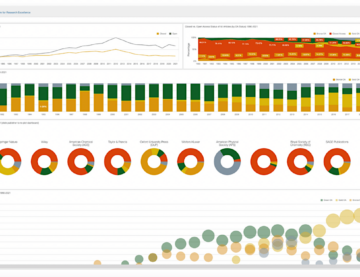The State of Open Data 2020 – Global Attitudes towards Open Data
New report outlines the impact of the Covid-19 pandemic on research and how this has influenced researchers’ data sharing behaviour
Today Figshare, the online digital repository for academic research, launched its annual report The State of Open Data 2020. The report is the fifth in the series and is the result of a collaboration between Figshare, Digital Science, Springer Nature and other leading industry and academic representatives. Alongside the survey results the report includes a collection of articles from global industry experts, as well as a foreword from Dr Leslie McIntosh, CEO of Ripeta and Executive Director, Emeritus – Research Data Alliance US.
The State of Open Data is now the longest-running longitudinal study on the subject, which was created in 2016, to examine attitudes and experiences of researchers working with open data – sharing it, reusing it, and redistributing it.
This year’s survey received around 4,500 responses from the research community and had an additional focus on research practices in the wake of the Covid-19 pandemic. It asked researchers how the pandemic was impacting their ability to carry out research, and their views on reuse of data and collaboration.
Key Covid-19 findings include:
- Over a third (32%) of academic researchers reported that their research had been ‘extremely’ or ‘very’ impacted by the outbreak of COVID-19.
- The disciplines affected most by COVID-19 were those working in Chemistry (47%), Biology (39%), Medicine (36%) and Materials Science (36%). The lowest level of impact was reported in Humanities and Social Sciences (20%)
- 43% of those surveyed have already or are likely to repurpose their grant to some extent for COVID-19 research
- Lockdown is seen by half of respondents as ‘extremely’ or ‘somewhat’ likely to result in re-use of open data provided by other labs, and 65% expect to reuse their own data.
- More than a third of researchers say they expect to see more collaboration as a result of COVID-19; for those in countries like Brazil and India where the impact of COVID-19 on research appears significant, around half expect collaboration to increase as a result.
The survey also included an expanded section on Data Management Plans (DMPs). With increasing numbers of funders around the world now mandating researchers to submit a DMP with their grant application, there has been a significant rise in the numbers of researchers creating them. There was further encouraging news that the FAIR principles – the foundation of good data management – were becoming more widely adopted and understood.
Other key report findings:
- The number of respondents who never make a data management plan halved from 30% to 15%
- In 2018, 60% of respondents had never heard of the FAIR principles, this year that number was down to 39% and the overall familiarity has increased from 15% to 24%.
- 55% of respondents felt that sharing data should be a part of the requirements for awarding grants
- 29% of respondents do not know who would cover the costs of making their research data open access
- Only 13% of respondents felt that researchers currently get sufficient credit for sharing data with 59% feeling they received too little credit.
- 68% of respondents indicated that full data citation was the credit mechanism that would motivate them to share their data. The second two most selected were increased impact and visibility of their research as well as co-authorship on papers that use their data.
- 38% of respondents noted their biggest concerns with sharing was the misuse of their data
- Of those who stated that they were concerned about misuse, 72% of the respondents were most concerned with misrepresentation, or selection of certain data points to support other theories.
Mark Hahnel, CEO and Founder, Figshare, said: “We’re proud to release our fifth State of Open Data report and feel inspired and encouraged that most trends are heading in the right direction. The current climate has put a spotlight onto the value and importance of data sharing, curation and good data management for boosting the reproducibility and reliability of research. COVID-19 has demonstrated that the research community has the ability to react to a crisis, and quickly. The data shows the importance of keeping universities open during lockdown as a third of the world’s research stopped due to Covid in the first lockdowns.”
Grace Baynes, Vice President, Data & New Product Development at Springer Nature, said: “The COVID-19 pandemic could be the best ever case study for open data. We often talk about how globally open, accessible and reusable data helps speed the pace of discovery and its benefit to society. This year, we are seeing that in action. Rapidly sharing data across geographic borders and between research teams is already bringing global benefit in understanding the virus, and developing mitigations and treatments. Every year, the State of Open Data survey brings us new insights, and we are proud to partner with Digital Science and Figshare to shine a light on where we are in 2020. While the benefit to the research community and society may grow clearer, we have to make sharing data worth the time and effort for individual researchers by ensuring they get sufficient credit for this. We also need to better understand and address researchers’ concerns about misuse and misrepresentation of data.”
The report contributions include:
Foreword
Dr Leslie McIntosh, CEO of Ripeta and Executive Director, Emeritus – Research Data Alliance US.
If A Researcher Would Meet A Librarian….
Mariëtte van Selm, Information Specialist (University Library), University of Amsterdam
How Repositories Can Help Drive Positive Change in Data Sharing
Kathleen Shearer, Executive Director, COAR
Merce Crosas, University Research Data Management Officer, HUIT, and Chief Data Science and Technology Officer, IQSS
Brian Nosek, Co-Founder and Executive Director of the Center for Open Science
Mark Hahnel, CEO and Founder of Figshare
What is the State of Open Data in 2020? It all Starts With a Good Plan
Alan Hyndman, Dan Penny & Greg Goodey
Research Practices in the Wake of COVID-19
Grace Baynes, Vice President, Research Data & New Product Development, Springer Nature
Mark Hahnel, CEO and Founder of Figshare
Download the report on Figshare now and you can share using #StateOfOpenData
Notes to editors
Figshare is a repository where users can make all of their research outputs available in a citable, shareable and discoverable manner. Figshare’s aim is to become the place where all academics make their research openly available. It provides a secure cloud based storage space for research outputs and encourages its users to manage their research in a more organized manner, so that it can be easily made open to comply with funder mandates. Openly available research outputs will mean that academia can truly reproduce and build on top of the research of others. Visit www.figshare.com
Digital Science is a technology company working to make research more efficient. We invest in, nurture and support innovative businesses and technologies that make all parts of the research process more open and effective. Our portfolio includes admired brands including Altmetric, CC Technology, Dimensions, Figshare, Gigantum, ReadCube, Symplectic, IFI Claims, GRID, Overleaf, Ripeta and Writefull. We believe that together, we can help researchers make a difference. Visit www.digital-science.com and follow @digitalsci on Twitter.
About Springer Nature
For over 175 years Springer Nature has been advancing discovery by providing the best possible service to the whole research community. We help researchers uncover new ideas, make sure all the research we publish is significant, robust and stands up to objective scrutiny, that it reaches all relevant audiences in the best possible format, and can be discovered, accessed, used, re-used and shared. We support librarians and institutions with innovations in technology and data; and provide quality publishing support to societies.
As a research publisher, Springer Nature is home to trusted brands including Springer, Nature Research, BMC, Palgrave Macmillan and Scientific American. For more information, please visit springernature.com and @SpringerNature.



